Inquivix HQ
1-903, 18 Eonju-ro 146-gil,
Gangnam-gu, Seoul, Korea
06057

If you are a dentist or own dental practice, you are well aware that online marketing is critical to your business’s success. You also know that ranking high on Google is essential in order to get the most traffic and leads. In this blog post, we will discuss some tips and tactics for improving your SEO for dentists. We will cover everything from keyword research to backlinking strategies. So, whether you are just starting out with SEO or you are looking to improve your current strategy, this blog post is for you!
What is SEO?
Before moving on to the strategical aspects of SEO, let’s first take a look at what SEO is. Search engine optimization (SEO) is a term that is used to describe the process of optimizing a website for search engines. In its simplest form, it’s the process of optimizing your website to make it more visible when people use Google, Bing, and other search engines to look for items or services linked to your company.
Marketing your dental practice is not just about getting new patients in the door. It’s also about keeping existing patients interested, engaged, and returning for more care. And it’s about nurturing customers who have had an experience with you but aren’t yet ready to make an appointment.
When someone searches for “dental services near me,” search engines will crawl through the web pages that have a high SEO score and rank them accordingly. If your website does not show up in search results for keywords related to your business, you are missing out on potential clients. When someone googles dental services in your area, you want your website to be one of the top results! Employing SEO will help make this happen. There are many techniques that can be used as part of an SEO campaign, all of which are designed to improve a site’s visibility and ranking amongst search engines.

What Is SEO and How Does It Work?
Let’s take a look at how SEO works. In order for search engines such as Google and Bing to crawl pages on the internet, they employ bots that travel from site to site, collecting information about those sites and putting them into an index. Consider the index, then, like a huge library where a librarian may consult a book (or a web page) to assist you in locating precisely what you need at any given moment.
Next, the index is analyzed by algorithms, which consider hundreds of ranking criteria or signals to determine how search results should be ordered for a given query. The search engine’s goal is to return search results that are both relevant and authoritative, in other words, search results that will best answer the searcher’s query. Search engines use complex algorithms to determine how web pages are ranked for any given search term or phrase. Those algorithms take into account factors like keyword usage, the relevance of content on the webpage, the quality of traffic coming from backlinks pointing at the webpage, loading speed, and more to give their rankings.
The search algorithms are intended to bring users to the most relevant and authoritative web pages. Using these criteria in mind, you can improve the ranking of your sites and the information they provide in search results.
What is Dental SEO?
What is dental SEO? Dental search engine optimization is the practice of optimizing a dental website for Google and other search engines. The goal of dental SEO is to improve the visibility and organic search results of a dental website. This can be done by improving the content, structure, and on-page elements of a website.
Dental SEO is the process of improving your dental practice’s visibility on search engine results pages (SERPs) without spending money on advertising. When a potential patient opens the Google search console and inputs “dentist near me” or any other combination of dental search phrases, an SEO strategy is what brings your clinic to the top of the list. If you want people to find your dental practice online, you need to have a plan for SEO.
What Is the Process of Dental SEO?
If you’re a dental practice, you know that online marketing is essential to your success. You may have a website, but if it’s not optimized for search engines, you’re losing out on potential patients. The goal of dental SEO is to improve your dental practice’s Google organic search rank without having to pay for it. Instead, it aims to pique consumer interest in high-quality information that identifies you or your practice as an expert in dentistry. The greatest SEO methods are based on well-established research and best practices. It should be an ongoing procedure that is updated and refined as search engine algorithm upgrades occur to be effectively effective.
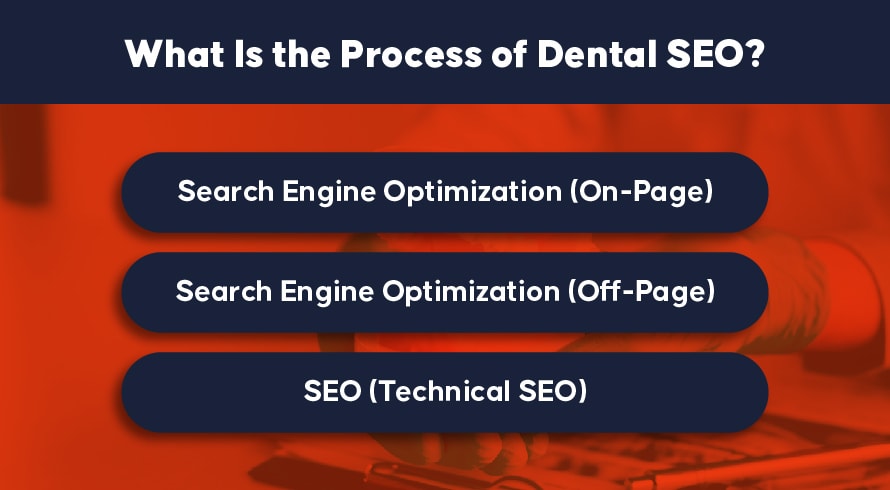
Search Engine Optimization (On-Page)
The first step is optimizing your page for search engines. It’s also called on-page SEO. This means that your website elements, such as URLs, content, titles, meta descriptions, alt texts, etc., are search engine optimized. To improve your on-page SEO, make sure all of your web pages are keyword-rich. This means using keywords throughout the text, including in the titles, metadata, and image tags. Use the Google Keyword Planner to find dental keywords that have low competition.
Search Engine Optimization Off-Page
Next, you need to focus on off-page aspects that add to the website’s SEO. This includes attracting quality backlinks, building dental influencer relationships, and dental social media marketing. You can drive promotional and awareness campaigns on social media sites to raise engagement. This would drive traffic back to your site, giving it the opportunity to rank higher in the SERPs as an active site.
SEO (Technical SEO)
One of the most important aspects of SEO is making sure your website’s technical side is up to par. Getting your page to load faster, improving your dental practice’s website design, and UX/UI design are some of the factors that add to the technical SEO. Making sure that your website’s technical aspects are optimized will help it get noticed by the search engine crawlers.
The Importance of SEO for Dentists
SEO brings dental practices several benefits. It can help a dental practice achieve its business goals, including increased website traffic and help with the competition. SEO isn’t just about improving search engine rankings; it’s also about providing valuable information to potential and current patients. When you optimize your website for the search engines, you build reliability and credibility and create a better website user experience.
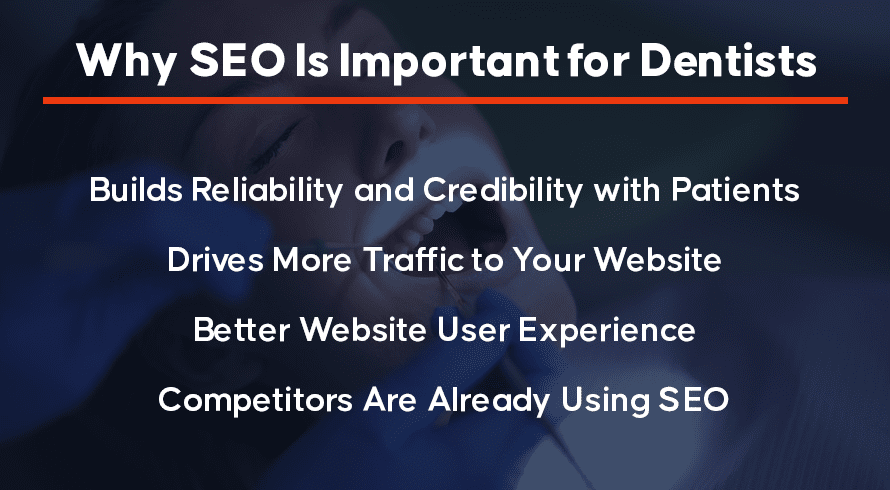
Increases Patient Reliability and Credibility
You may earn the confidence of potential patients by employing dental SEO and establishing yourself as an industry leader. Consider this: a dental practice website that shows up as a top result and appears to be more reputable than one on the tenth page of Google. People are aware that Google places a premium on trustworthy websites, so obtaining a higher search ranking will help you appear as a high-authority site.
Increases Traffic to Your Website
What are the top websites for finding new dental practices? Patients begin their search for a dentist or dental services on the internet. The greater your ranking, the more visitors you will receive to your website. Dentists’ website traffic equals potential patients that you may convert into clients. Your existing patients may search for you on the internet, but one of the dental SEO benefits is the opportunity to target new patients. To acquire new patients, you might select keywords that are relevant to those who are looking for various types of dental care. This would drive more traffic to your website.
Better Website User Experience
The ultimate goal of a comprehensive SEO strategy is usually an improved website. Because the success of your SEO campaign is so dependent on the quality of your website, you’ll be compelled to update it in order to provide genuine value to visitors. With SEO in mind, you may add important features to improve and increase the value of your website. This will lead to a better user experience, making your website visitors engage with the site more. As your website becomes more valuable, it will naturally rank higher in the SERPs.
Your Competitors Are Using SEO Already
If you are not using SEO on your website, you have already lost the match because your competitors are definitely doing SEO. In order to stay competitive, it is crucial that you utilize SEO in the most productive way. You may also use SEO monitoring to keep an eye on your competition. You’ll be able to keep an eye on what they’re up to and figure out what your target patients are looking for, which can help you attract new patients. Adjusting your SEO strategies to outsmart your competitors will assist you in driving more website traffic and attracting new patients.
9 Best SEO Practices for Dentists to Implement in Order to Rank Number One on Google
Google is the number one search engine in the world, so it’s no wonder that dentists are trying to figure out how to rank their dental websites as high as possible in Google search results. The good news is that there are some simple steps you can take to help improve your ranking and drive more traffic to your website.
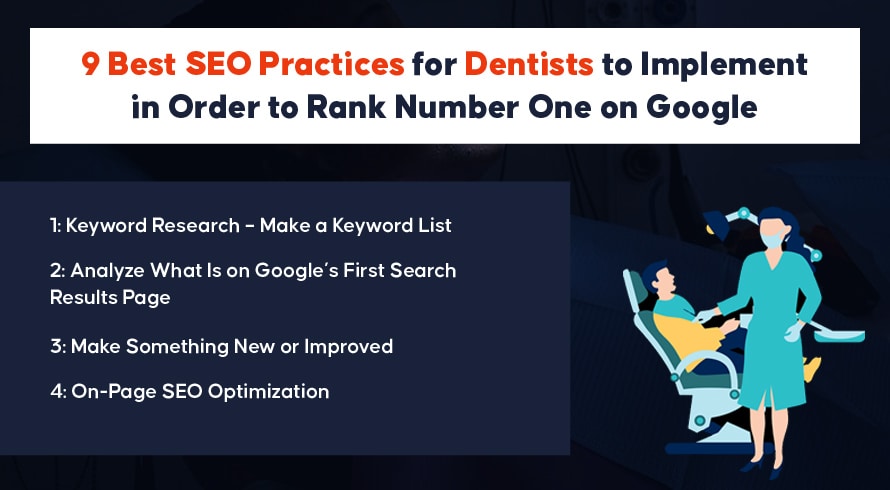
Keyword Research – Make a Keyword List
The first step in any successful SEO strategy is to figure out which keyword terms your target audience is searching for and which ones you’re currently ranking for. This procedure is known as “keyword research,” and we strongly advise employing a tool like Google Keyword Manager to discover how much traffic each keyword phrase might produce. Once you figure out which dental SEO keywords are best for your website, you are one step closer to achieving your SEO targets.
Analyze What Is on Google’s First Search Results Page
As an extension of your keyword research, check what appears on the top page of Google when you search for terms relevant to your practice and the area in which you practice. This will give you new ideas and assist in the formation of a viable keyword list.
Make Something New or Improved
It would be difficult to disagree that excellent writing is essential. There’s no way around the need to write well. Once you’ve decided to create a piece of content, make sure it’s about something you want the users to be excited about, so you can utilize your best terms from the keyword research. Make your material easy to read. Don’t use big paragraphs in a desperate attempt to put in all the information you think is important. Break them up into small, easily digestible chunks using lists or headlines. And finally, don’t forget to proofread! Nothing will make your great writing look worse than careless mistakes. Typos and grammar errors scream “amateur!”
On-Page SEO Optimization
While optimizing your website for on-page SEO may appear to be a challenging process, it is actually quite simple when broken down into smaller phases. Here are some simple methods for improving the pages of your website for on-page SEO.
- Choose keywords that accurately reflect the content of your page.
- Create an intriguing title and meta description that will entice people to click on your material.
- Create professional-looking images and videos that will boost your Google image and video search rankings.
- Use a free tool like Google Search Console to analyze your on-page SEO.
- Make sure all of your pages are mobile-friendly and also optimized for other smart devices.
Local SEO Optimize Your Website
People look for a physician or a dentist in their community or local region, much as they would for a school. As a result, your SEO strategy must reflect the importance of this “local” focus in your future patients’ search intent. This is as simple as adding your location to page names, URLs, and photos where necessary. To make your small business more visible, add a phone number and proper address and get listed on Google My Business, Google Maps, and other directory sites so that you get discovered in local searches from outside your immediate area.
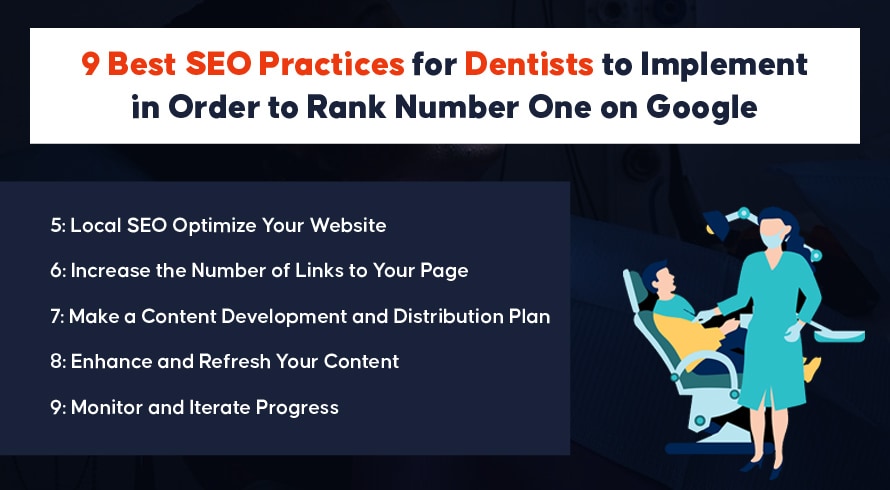
Increase the Number of Links to Your Page
The number of backlinks to your website affects your search position. The quality of these backlinks, as well as the quantity, is a key indicator for search engines. Backlinks from questionable websites that are members of link farms or private blog networks may harm the rating of your website. It also implies that you must earn high-quality links to keep your ranks. Backlinks from high-quality sites have the potential to raise your search rankings as well as position you as a voice of authority in your industry.
Make a Content Development and Distribution Plan
It’s critical to target the appropriate keywords, but rankings won’t help you much if you don’t have useful material on your website to support them. This is why you must produce content that establishes you and your practice as an authoritative voice in the dental community while also providing useful information to potential patients.
We propose using SEO tools to get a sense of what subjects are currently popular, then figure out how you might offer relevant articles or blog posts that satisfy those demands. After you’ve finished writing it, share it via email newsletters, social media platforms (such as Facebook and Instagram), blogs on your website, and other marketing platforms. Finally, we recommend creating a list to keep track of what was generated, shared, and distributed.
Enhance and Refresh Your Content
If you don’t keep your website content up-to-date, you’re not doing yourself a service. A content audit is a thorough examination of your current website or blog to determine what needs to be updated and how it may be improved. One of the most essential things you can do after an update is to measure your changes thoroughly. To assess the effectiveness of your update, begin by ensuring that your analytics are up and running. You should also have a distinct link-acquisition strategy in place. Using tools to track your link-building strategy might be time-consuming and complicated, but there are several options available. It may appear difficult at first, but perseverance will pay off in the end.
Monitor and Iterate Progress
Once you’ve produced content, it’s time to keep an eye on how it’s doing. Google Analytics provides excellent data on the topics that brought visitors to your site as well as keywords that attracted them. Then, based on the data accumulated by these search engines, figure out which keywords are most effective at attracting potential patients to your website and adjust your approach accordingly. The most effective SEO tactics are dynamic and iterative, which means they’re always evolving to keep up with changes in Google’s search algorithm. If you hadn’t optimized your content or website for mobile devices when it was created, there’s a chance Google wouldn’t have ranked you for certain keywords. Now that Google has made it clear that mobile-friendly sites are given a priority,
Why Is Local SEO Important for Dentists Trying to Rank #1 on Google?
The aim of dental SEO is to generate leads and entice potential patients to visit a dentist’s office. If you’re a dentist, you’ve probably heard that direct mail and other pre-millennial marketing methods aren’t effective any longer. This is one of the reasons why dental local SEO has become so popular recently.
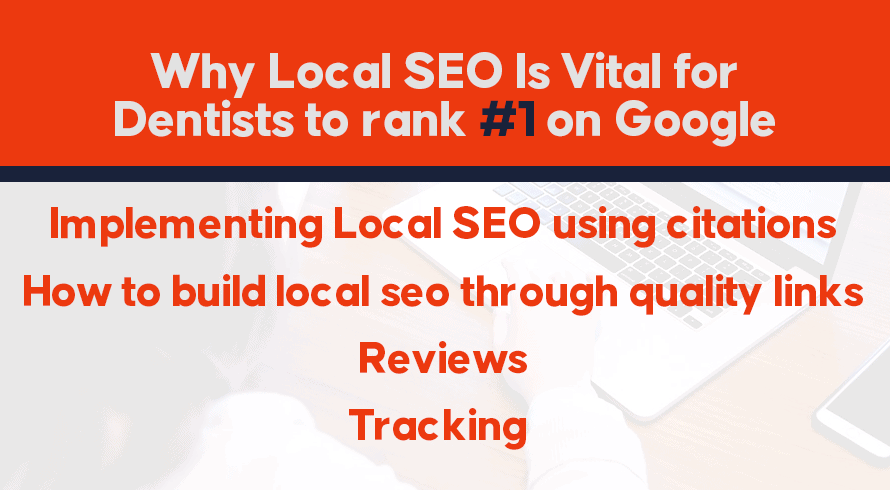
Online visibility is essential for small and medium-sized enterprises to survive and develop as prominent brands. Dental practices can’t afford to ignore any strategies for displaying their services online in the age of smartphones. Overlooking the most up-to-date best practices might bring your dental practice down. If you want your dental treatments to flourish in the digital world, you must understand the value of local SEO techniques.
Using Citations to Implement Local SEO
These are remarks that are connected to your dental practice’s name, address, and phone number (NAP). It’s ideal if you can obtain citations and links to your website from local market directories, niche-specific websites and applications, and social media sites. Local citations might assist your potential clients in locating your dental practice online. It may also have an effect on the position of local search rankings. For dental professionals, the Google My Business page is a major directory listing. However, there are several alternative local citation sites for dentists to help you rank first on the Google search results page.
How to Improve Local SEO with Quality Links?
Google places high importance on the sites to which your dental website is connected. Links are similar to votes in terms of boosting the authority and significance of your website. Link building is an effective strategy for improving the quality of your site. To obtain these high-quality links, you must implement certain techniques.
You may connect to each other by recommending resources on your website if you have a positive referral relationship with other medical professionals. Spending time on local PR outreach is another approach to acquiring a high-quality link to your dental website. Offering a free dental checkup or informing the public about an award or accolade is a wonderful way to get online and offline media attention.
Reviews
Providing outstanding service is the key to obtaining patient evaluations. Aside from that, you can ask your patients to leave a review for your dental practice, but you must make it easy for them. The best approach to obtaining client feedback is to send them a personalized email along with a request for them to post a positive review on your Google My Business profile.
Tracking
Tracking is important for monitoring the success of a dental website’s local SEO effort. The three core metrics you must track are rankings, traffic, and conversions. It’s important to keep an eye on the rankings of specific locations’ keywords. Rankings must be examined once or twice a month in most cases. You should also keep track of how much traffic you are obtaining. In internet marketing, “traffic” refers to people who visit your website, which includes potential clients. You must keep track of the number of conversions you get from dental SEO efforts, as well as rankings and traffic. The action you want your website visitor to take is known as a conversion.
Conclusion
SEO for dentists can be a little tricky, but with a few simple steps, you can make sure that your website is the first one that comes up when someone searches for a “dentist” in their area. SEO is an ever-changing landscape, so it is important to stay up to date on the latest trends and changes. Make sure that you are regularly publishing content on your website, optimizing your titles and descriptions, and using the right keywords for your practice. If you follow these simple steps, you will be able to dominate the search engine results.
